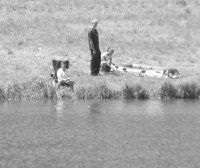| Fishing is a favorite pasttime for many Carbon County residents. Although some residents may have the space to install a private fishing pond, they must first check with Division of Wildlife Resources to ensure that a pond may be build. Officials will instruct the owner of what is required to maintain a pond and what requirements must be met. |
On June 25 conservation officers with the Utah Division of Wildlife Resources served a search warrant on an allegedly unlicensed private fish pond located adjacent to Mammoth Creek in Garfield County.
The officers seized 69 rainbow trout and three brown trout from the pond. All the fish in the pond were destroyed.
An investigation into the case is continuing and the DWR is releasing few details.
The possession of live game fish is highly regulated because of the potential for the transmission of diseases and illegal introduction of fish into public fisheries. Diseases and illegal introduction of undesirable fish species are very costly to Utah anglers in terms of license dollars and fishing opportunities that are lost as efforts are made to recover fisheries effected by these introductions.
Utah law requires that a person obtain a permit from the DWR before developing or operating a private fish installation. As part of the permitting process, the DWR inspects the facility to make sure it doesn’t pose a threat to public fisheries and that screens are in place to prevent the exchange of fish between the private pond and public fisheries.
The DWR also provides advice on the suitability of the pond for various species of fish. Fish to stock in private fish ponds can only be obtained from certified disease free fish producers. Fish producers are licensed and regulated by the Utah Department of Agriculture.
It is illegal to stock private fish ponds with fish obtained from public fisheries. The transportation of live game fish taken from public fisheries is against the law. Unless they are dead, fish caught from public fisheries may not be transported away from the water in which they were caught.
Utah laws regarding the possession of fish can be viewed on the internet at www.le.state.ut.us. Further information about laws regulating the taking and possession of fish can be found in the 2002 Utah fishing proclamation, which is available from fishing license agents throughout Utah or online at www.wildlife.utah.gov/02fishing.htm.
Those who are interested in obtaining a private fish pond permit, or want more information about private fish ponds, may contact the nearest DWR regional office.
Violations of wildlife laws can be reported via the Utah help stop poaching hotline at 1-800-662-3337, or by e-mail to helpstoppoaching@utah.gov.

